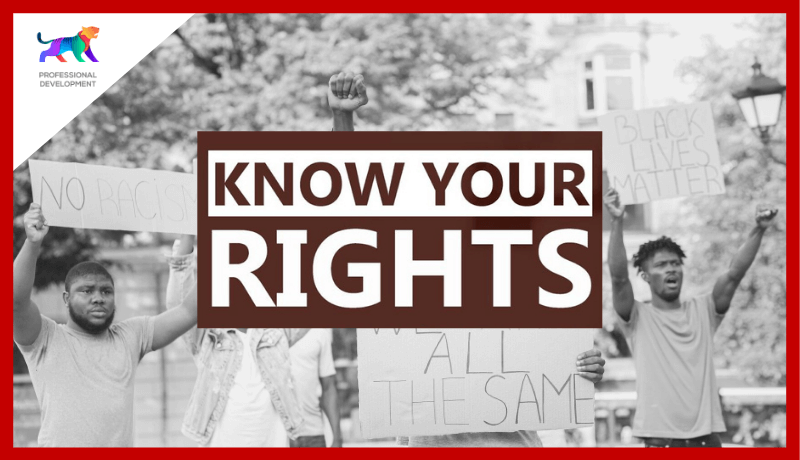“You can’t fight for your rights if you don’t know what they are.”
John Roberts, Chief Justice of the United States
“Know Your Rights” was an educative virtual session on human rights and their practical applications in our lives. The guest speaker for the event, Ms. Danushka Medawatta, a Senior Lecturer at the Faculty of Law of University of Colombo, highlighted several key areas where some very important human rights often get violated. The session was conducted via Zoom and Facebook LIVE on the 08th of August under the professional development avenue.
“Human rights” has become an increasingly and profoundly discussed topic in our society due the major abuses and violations we witnessed in the recent decades. Why do these violations happen? What actions can we take in such cases? Ms.Danushka shed a light on these areas and assisted in reducing the knowledge gap (to a great extent I would say!) through this informative session.
She started off by giving us a brief understanding on what human rights are and discussing whether human rights are controversial. She elaborated on the two main views of human rights in Sri Lanka: first being that human rights are “the best thing” and international mechanisms are always available to obtain human rights in case the state does not do the right thing and the second being that the use of such international mechanisms could influence Sri Lanka and make anyone and everyone who uses them a traitor.
Then she further explained a few examples and incidents that have led to the evolution of human rights in the world, such as:
- Torturing of black slaves in cotton farms in the US
- Holocaust and their “horrors”
- Foot binding’ tradition in Japan and China
- Genital mutilations
- Disappearances of people and children in many countries of the world
- Discrimination in South Africa to distinct black skinned people from the white skinned people.

Ms. Danushka also spoke about how human rights are constantly under attack, all over the world in general. Black Lives Matter movement in the US is a timely example she used to explicate that not only the developing countries, but also how the so-called developed countries face such issues in the modern days.

In the next segment of the session, Ms.Danushka spoke about the history of human rights where she gave an insight on several categories of rights such as civil and political rights, economic, social and cultural rights that were formulated. She described the timeline as follows:
- In 1948, after the second world war, people realized that actions must be taken to prevent such wars from happening again: this is what we now know as the Universal Declaration of Human Rights.
- In 1966, the International Bill of Rights was formulated. It has two main covenants: International Covenant on Civil and Political Rights and International Covenant on Economic, Social and Cultural Rights.
Then she pointed out the human rights practices in Sri Lanka, how our country adopts the human rights available in the international arena and whether Sri Lanka must practice ‘ALL’ the international human rights or adopt only the rights suitable and relevant for our domestic framework. One of the many things we did not know was that the Parliament of Sri Lanka can study the international convention and develop the Sri Lankan Parliament enactment accordingly. She then proceeded to talk about the Universalist vs Cultural Relativist debate and then explained the distinction between Human Rights and Fundamental Rights.
One specific challenge relevant to fundamental rights that she discussed was the fact that: if more importance was given to Economic, Social and Cultural rights, some of the prominent and fundamental rights might have to be undermined.
Thereupon, Ms. Danushka described two general categorizations of rights:
- Positive rights – The rights which require a certain state to spend many resources and money to protect such rights.
- Negative rights – The rights when a state does not necessarily have to spend a lot of money and resources to protect such rights.
“Can the state prevent or restrict us from exercising some human rights?” was the next important point that she brought to our attention. The short answer is “Yes”, but only within certain limitations, but on the contrary some rights cannot be restricted at all.
Subsequently, Ms. Danushka discussed about relative rights and explained the importance of protecting the minority’s rights. The next part of the session was dedicated to discussing about the COVID-19 pandemic and its impact on human rights. Ms. Danushka explained that the restrictions of our rights due to the long curfews, postponing of the general election, and other restrictions put on us were possible as there was a threat to national security, public health and that it was a state of emergency.
So, what should be done if any of these rights are violated? A fundamental rights action cannot be brought up against anyone. She clarified that for an individual to bring up a fundamental rights action against another party in the Supreme Courts, that party must be someone from the executive or administrative authorities of the state who has violated the individual’s rights. She also pointed out that:
- the individual must be the victim or the victim’s attorney at law in order to be able to file a case,
- hearing of such cases would only be done at the Supreme Courts
- the individual must go to courts within one month of the incident of violation (or else the individual will be “time barred” due to the lapse of time).
But hold on! What can the individual do if he/ she is unhappy with the ruling given by the Supreme Courts and he/she has already tried every domestic mechanism available? Ms. Danushka didn’t forget to clarify this point. She stated that in such cases, the individual can seek assistance from the trinity bodies of the United Nations.
Editors Note: Now that’s a lot of information to keep in mind in case you’ve missed the session!
Towards the end of the session, Rtr. Kavisha, the moderator, asked the guest speaker a few of the questions raised from the audience and Ms.Danuska answered them with much coherence. Some of these answers revealed very interesting and important facts. Finally, the session was concluded with Rtr. Malki delivering the Vote of Thanks.
“Know your rights” was certainly a very informative session about human rights and fundamental rights that provided the audience with vital information that would be helpful in their day to day lives.
Learnt a great deal of human rights? How about enriching yourself with some labor rights? Join us today at 7.00 P.M [13.09.2020] via Zoom for Phase 2 of Know Your Rights.


Written by:
Rtr. Kaushalya Dabare
(Member-2020/21)

Edited by:
Rtr. Razna Farook
(Blog Team Member-2020/21)




